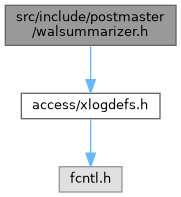#include "access/xlogdefs.h"

Go to the source code of this file.
Functions | |
| Size | WalSummarizerShmemSize (void) |
| void | WalSummarizerShmemInit (void) |
| pg_noreturn void | WalSummarizerMain (const void *startup_data, size_t startup_data_len) |
| void | GetWalSummarizerState (TimeLineID *summarized_tli, XLogRecPtr *summarized_lsn, XLogRecPtr *pending_lsn, int *summarizer_pid) |
| XLogRecPtr | GetOldestUnsummarizedLSN (TimeLineID *tli, bool *lsn_is_exact) |
| void | WakeupWalSummarizer (void) |
| void | WaitForWalSummarization (XLogRecPtr lsn) |
Variables | |
| PGDLLIMPORT bool | summarize_wal |
| PGDLLIMPORT int | wal_summary_keep_time |
Function Documentation
◆ GetOldestUnsummarizedLSN()
|
extern |
Definition at line 504 of file walsummarizer.c.
References AmWalSummarizerProcess, ereport, errcode(), errmsg_internal(), ERROR, fb(), GetLatestLSN(), GetWalSummaries(), WalSummarizerData::initialized, InvalidXLogRecPtr, lfirst, list_length(), list_nth(), WalSummarizerData::lsn_is_exact, LW_EXCLUSIVE, LW_SHARED, LWLockAcquire(), LWLockRelease(), WalSummarizerData::pending_lsn, readTimeLineHistory(), summarize_wal, WalSummarizerData::summarized_lsn, WalSummarizerData::summarized_tli, wal_segment_size, WalSummarizerCtl, XLogGetOldestSegno(), and XLogSegNoOffsetToRecPtr.
Referenced by KeepLogSeg(), and WalSummarizerMain().
◆ GetWalSummarizerState()
|
extern |
Definition at line 446 of file walsummarizer.c.
References fb(), GetPGProcByNumber, WalSummarizerData::initialized, INVALID_PROC_NUMBER, InvalidXLogRecPtr, LW_SHARED, LWLockAcquire(), LWLockRelease(), WalSummarizerData::pending_lsn, WalSummarizerData::summarized_lsn, WalSummarizerData::summarized_tli, WalSummarizerData::summarizer_pgprocno, and WalSummarizerCtl.
Referenced by pg_get_wal_summarizer_state().
◆ WaitForWalSummarization()
|
extern |
Definition at line 659 of file walsummarizer.c.
References CHECK_FOR_INTERRUPTS, ConditionVariableCancelSleep(), ConditionVariableTimedSleep(), ereport, errcode(), errdetail(), errmsg(), errmsg_plural(), ERROR, fb(), GetCurrentTimestamp(), InvalidXLogRecPtr, LSN_FORMAT_ARGS, LW_SHARED, LWLockAcquire(), LWLockRelease(), WalSummarizerData::pending_lsn, summarize_wal, WalSummarizerData::summarized_lsn, WalSummarizerData::summary_file_cv, TimestampDifferenceMilliseconds(), TimestampTzPlusMilliseconds, WalSummarizerCtl, and WARNING.
Referenced by CleanupAfterArchiveRecovery(), and PrepareForIncrementalBackup().
◆ WakeupWalSummarizer()
Definition at line 636 of file walsummarizer.c.
References fb(), GetPGProcByNumber, INVALID_PROC_NUMBER, LW_SHARED, LWLockAcquire(), LWLockRelease(), SetLatch(), WalSummarizerData::summarizer_pgprocno, and WalSummarizerCtl.
Referenced by CreateCheckPoint().
◆ WalSummarizerMain()
|
extern |
Definition at line 213 of file walsummarizer.c.
References ALLOCSET_DEFAULT_SIZES, AllocSetContextCreate, Assert, AtEOXact_Files(), AtEOXact_HashTables(), AuxiliaryProcessMainCommon(), ConditionVariableBroadcast(), ConditionVariableCancelSleep(), DEBUG1, EmitErrorReport(), ereport, errmsg_internal(), error_context_stack, fb(), FlushErrorState(), GetLatestLSN(), GetOldestUnsummarizedLSN(), HOLD_INTERRUPTS, InvalidXLogRecPtr, LSN_FORMAT_ARGS, WalSummarizerData::lsn_is_exact, LW_EXCLUSIVE, LWLockAcquire(), LWLockRelease(), LWLockReleaseAll(), MaybeRemoveOldWalSummaries(), MemoryContextReset(), MemoryContextSwitchTo(), MyProcNumber, on_shmem_exit(), WalSummarizerData::pending_lsn, PG_exception_stack, pgaio_error_cleanup(), pgstat_report_wait_end(), pqsignal, proc_exit(), ProcessWalSummarizerInterrupts(), procsignal_sigusr1_handler(), readTimeLineHistory(), ReleaseAuxProcessResources(), RESUME_INTERRUPTS, SIGALRM, SIGCHLD, SIGHUP, SignalHandlerForConfigReload(), SignalHandlerForShutdownRequest(), SIGPIPE, SIGUSR1, SIGUSR2, WalSummarizerData::summarized_lsn, WalSummarizerData::summarized_tli, WalSummarizerData::summarizer_pgprocno, SummarizeWAL(), WalSummarizerData::summary_file_cv, tliSwitchPoint(), TopMemoryContext, UnBlockSig, WaitLatch(), WalSummarizerCtl, WalSummarizerShutdown(), WL_EXIT_ON_PM_DEATH, WL_TIMEOUT, and XLogRecPtrIsValid.
◆ WalSummarizerShmemInit()
Definition at line 182 of file walsummarizer.c.
References ConditionVariableInit(), WalSummarizerData::initialized, INVALID_PROC_NUMBER, InvalidXLogRecPtr, WalSummarizerData::lsn_is_exact, WalSummarizerData::pending_lsn, ShmemInitStruct(), WalSummarizerData::summarized_lsn, WalSummarizerData::summarized_tli, WalSummarizerData::summarizer_pgprocno, WalSummarizerData::summary_file_cv, WalSummarizerCtl, and WalSummarizerShmemSize().
Referenced by CreateOrAttachShmemStructs().
◆ WalSummarizerShmemSize()
Definition at line 173 of file walsummarizer.c.
Referenced by CalculateShmemSize(), and WalSummarizerShmemInit().
Variable Documentation
◆ summarize_wal
|
extern |
Definition at line 144 of file walsummarizer.c.
Referenced by CleanupAfterArchiveRecovery(), GetOldestUnsummarizedLSN(), LaunchMissingBackgroundProcesses(), parse_basebackup_options(), PostmasterMain(), ProcessWalSummarizerInterrupts(), and WaitForWalSummarization().
◆ wal_summary_keep_time
|
extern |
Definition at line 145 of file walsummarizer.c.
Referenced by MaybeRemoveOldWalSummaries().